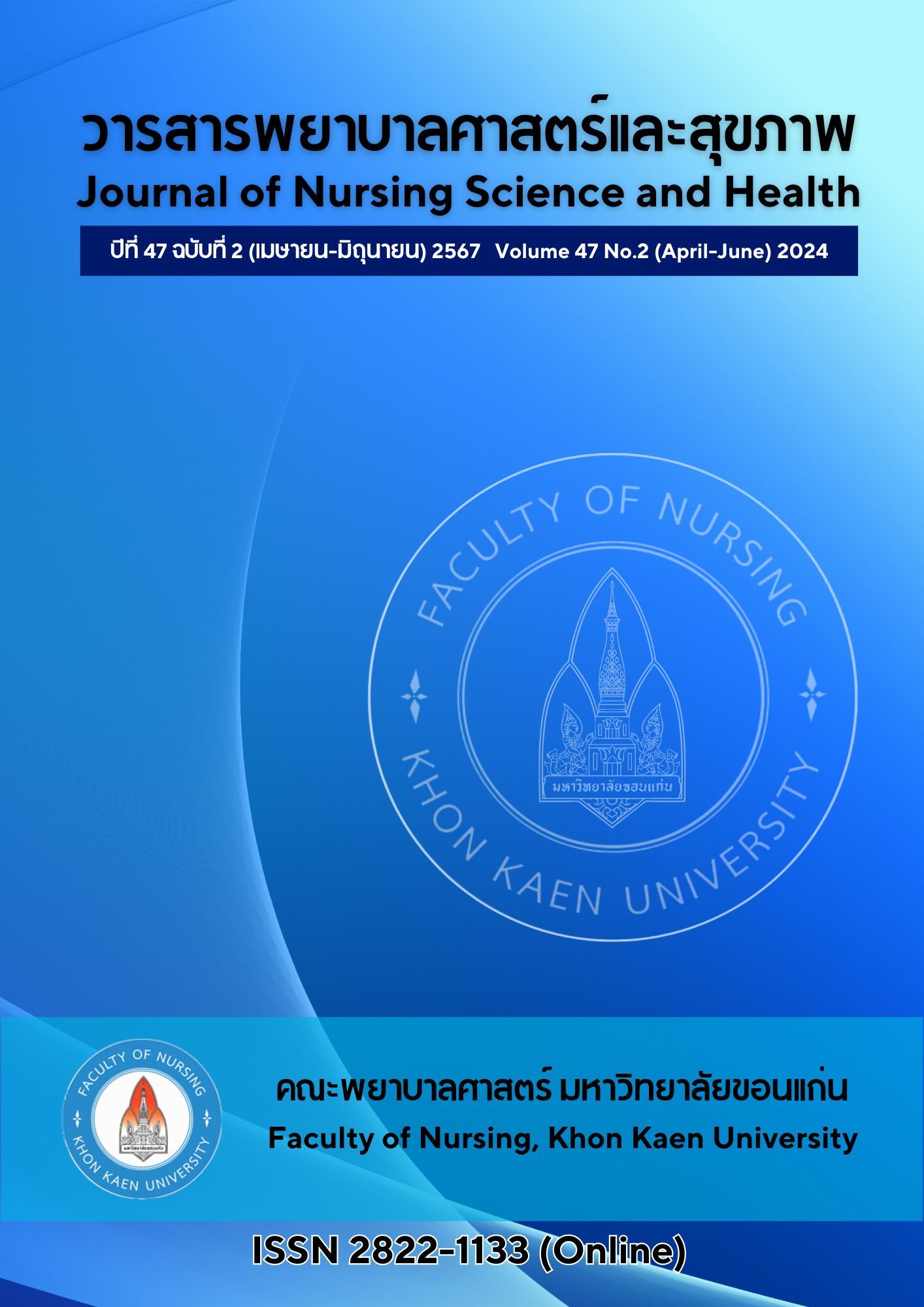ผลของโปรแกรมการดูแลช่องปากต่อสุขภาพช่องปาก ความสามารถในการดูแลช่องปากด้วยตนเอง และการติดเชื้อแผลผ่าตัดในผู้ป่วยมะเร็งช่องปากที่ได้รับการผ่าตัด
คำสำคัญ:
การติดเชื้อแผลผ่าตัด , ความสามารถในการดูแลตนเอง , โปรแกรมการดูแลช่องปาก , ผู้ป่วยมะเร็งช่องปาก, สุขภาพช่องปากบทคัดย่อ
การวิจัยกึ่งทดลองนี้ มีวัตถุประสงค์เพื่อศึกษาผลของโปรแกรมการดูแลช่องปากต่อสุขภาพช่องปาก ความสามารถในการดูแลช่องปากด้วยตนเอง และการติดเชื้อแผลผ่าตัดในผู้ป่วยมะเร็งช่องปากที่ได้รับการผ่าตัด ที่เข้ารับการรักษาที่โรงพยาบาลมะเร็งแห่งหนึ่งในภาคตะวันออกเฉียงเหนือ ระหว่างเดือนกุมภาพันธ์ - พฤษภาคม 2566 โดยคัดเลือกกลุ่มตัวอย่างแบบเจาะจง จำนวน 50 ราย กลุ่มควบคุม จำนวน 25 ราย และกลุ่มทดลอง จำนวน 25 ราย เครื่องมือที่ใช้ในการวิจัย ประกอบด้วย 1) เครื่องมือที่ใช้ในการเก็บรวบรวมข้อมูล ได้แก่ แบบประเมินสุขภาพช่องปาก แบบประเมินความสามารถในการดูแลช่องปาก และแบบประเมินการติดเชื้อแผลผ่าตัดในช่องปาก ตรวจสอบความตรงตามเนื้อหาจากผู้เชี่ยวชาญ 5 ท่าน ได้ค่าเท่ากับ 0.94, 1.00 และ 1.00 ตามลำดับ ตรวจสอบความเชื่อมั่นของเครื่องมือระหว่างผู้ประเมิน (inter-rater reliability) ได้เท่ากับ 0.91, 0.94 และ 0.97 ตามลำดับ 2) เครื่องมือที่ใช้ในการทดลอง ได้แก่ โปรแกรมการดูแลช่องปากประกอบด้วย วิดีทัศน์ และแผ่นพับการดูแลความสะอาดช่องปากด้วยตนเอง วิเคราะห์ข้อมูลส่วนบุคคล โดยสถิติเชิงบรรยาย เปรียบเทียบค่าคะแนนสุขภาพช่องปาก คะแนนความสามารถในการดูแลช่องปากด้วยตนเอง ก่อนและหลังทดลองภายในกลุ่มทดลองและกลุ่มควบคุม ด้วยสถิติ Wilcoxon matched pairs signed ranks test เปรียบเทียบค่าคะแนนสุขภาพช่องปาก คะแนนความสามารถในการดูแลช่องปากด้วยตนเองก่อนและหลังทดลองระหว่างกลุ่มทดลองและกลุ่มควบคุม ด้วยสถิติ Mann-Whitney U test เปรียบเทียบการติดเชื้อแผลผ่าตัด ระหว่างกลุ่มทดลองและกลุ่มควบคุม ด้วยสถิติ fisher’s exact test
ผลการวิจัยพบว่า 1) หลังการทดลองกลุ่มทดลองมีปัญหาสุขภาพช่องปากน้อยกว่ากลุ่มควบคุม อย่างมีนัยสำคัญทางสถิติ (p<0.001) 2) หลังได้รับโปรแกรมกลุ่มทดลองมีปัญหาสุขภาพช่องปากน้อยกว่าก่อนได้รับโปรแกรม อย่างมีนัยสำคัญทางสถิติ (p<0.001) 3) หลังการทดลองกลุ่มทดลองมีความสามารถในการดูแลช่องปากด้วยตนเองสูงกว่ากลุ่มควบคุม อย่างมีนัยสำคัญทางสถิติ (p<0.001) 4) หลังได้รับโปรแกรมกลุ่มทดลองมีความสามารถในการดูแลช่องปากด้วยตนเอง สูงกว่าก่อนได้รับโปรแกรม อย่างมีนัยสำคัญทางสถิติ (p<0.05) และ 5) หลังการทดลองกลุ่มทดลองมีการติดเชื้อแผลผ่าตัดน้อยกว่ากลุ่มควบคุม อย่างมีนัยสำคัญทางสถิติ (p<0.05)
เอกสารอ้างอิง
Ferlay J, Ervik M, Lam F, Laversanne M, Colombet M, Mery L, et al. Global cancer observatory: cancer today. Lyon France: International Agency for Research on Cancer [Internet]. 2024 [cite 2024 Jan 30]; Available from: https://gco.iarc.who.int/today
World Health Organization. The glolbocan [Internet]. 2024 [cite 2024 Jan 15]. Available from: https://gco.iarc.who.int/today
Montero PH, Patel SG. Cancer of the oral cavity. Surg Oncol Clin N Am 2015;24(3):491–508.
Rashid A, Warnakulasuriya S. The use of light-based (optical) detection systems as adjuncts in the detection of oral cancer and oral potentially malignant disorders: a systematic review. J Oral Pathol Med 2015;44(5):307–28.
Sudchai S. Feasibility of post-operative recovery program in patients with mouth and oral cavity cancer. TJNMP 2019;6(2):31-47. (in Thai)
Coyle MJ, Main B, Hughes C, Craven R, Alexander R, Porter G, et al. Enhanced recovery after surgery (ERAS) for head and neck oncology patients. Chi Otolaryngol 2016;41(2):118-26.
Ellis MA, Graboyes EM, Wahlquist AE, Neskey DM, Kaczmar JM, Schopper HK, et al. Primary surgery vs radiotherapy for early-stage oral cavity cancer. Otolaryngol Head Neck Surg 2018;158(4):649–59.
Vatanasapt P. Oral Cancer Khon Kaen University. Khon Kaen: Khon Kaen University; 2021. (in Thai)
Nair D, Singhvi H, Mair M, Qayyumi B, Deshmukh A, Pantvaidya G, et al. Outcomes of surgically treated oral cancer patients at a tertiary cancer center in India. Indian Journal of Cancer 2017;54(4):616–20.
Thanamornphong C, Kimpee S, Chaiphutta P, Wongkongkham K, Kasetkul P. Correlation between cancer care needs, tongue condition, comorbidity and oral functional status in post-operative tongue cancer and mouth-floor cancer patients. JTNMC 2014;29(1):67-80. (in Thai)
Orem DE. Nursing: concepts of practice. 6th ed. St. Louis: Mosby; 2001.
Mizuno H, Mizutani S, Ekuni D, Tabata-Taniguchi A, Maruyama T, Yokoi A, et al. New oral hygiene care regimen reduces postoperative oral bacteria count and number of days with elevated fever in ICU patients with esophageal cancer. J Oral Sci 2018;60(4):536–43.
Huang BS, Wu SC, Lin CY, Fan KH, Chang JTC, Chen SC. The effectiveness of a saline mouth rinse regimen and education programme on radiation-induced oral mucositis and quality of life in oral cavity cancer patients: a randomised controlled trial. Eur J Cancer Care 2018;27(2):e12819.
Ngammuk K, Na Ayutthaya S, Phinyopasakul W. Oral care practice guideline in critical ill patients to prevent ventilator-associated pneumonia. VNJ 2016;18(2):1-11. (in Thai)
Patient register Udon Thani Cancer Hospital. Report statistics [Internet]. 2024 [cite 2020 Oct 2]; Available from:http://www.udch.go.th/thai
Sajai K, Kitsripirarn S, Bannassaan B. The effects of a self-management promotion on the oral care behavior and oral mucositis of cancer patients receiving chemotherapy. SKHJ 2018;21(2):42-56. (in Thai)
Department of Health Ministry of Public Health. Recommended tooth brushing formula 2-2-2 [internet]. 2024 [cite 2020 Oct 10]. Available from: https://wongkarnpat.com/viewpat.php?id=962
Plaibun S, Kongsuwan W, Dumkleang J. The development of clinical nursing practice guidelines for oral health care in dependent patients. Songklanagarind J Nurs 2020;40(3):37-47. (in Thai)
World Health Organization. ICD-10: international statistical classification of diseases and related health problem: tenth revision. 2nd ed. Geneva: WHO; 2004.
Shi M, Han Z, Qin L, Su M, Liu Y, Li M, et al. Risk factors for surgical site infection after major oral oncological surgery: the experience of a tertiary referral hospital in China. J Int Med Res 2020;48(8):300060520944072.
Puangkamyad A, Namjuntra R, Binhosen V. Effects of an oral care program on oral care ability and oral mucositis among cancer patients receiving chemotherapy. TRC Nurs J 2012;10(2):57-73. (in Thai)
Deklee N, Jitpanya C. The Effect of oral self-care promoting program combined with virgin coconut oil pulling on oral mucositis in head and neck cancer patients receiving radiotherapy or concurrent chemo-radiotherapy. Academic Journal of MCU 2016;20(39):81-95. (in Thai)
Nakhonchai T, Methakanjanasa N. Effects of a self-management program on oral mucositis and nutrition status in patients with head and neck cancer receiving radiotherapy. Journal of Nursing Science and Health 2020;44(1):26-37. (in Thai)
Phueanphimai N. Oral care and mucositis after the supportive-educative nursing program in patients with head and neck cancer. APHEIT SOCIAL SCIENCE 2016;5(1):88-100. (in Thai)
Sannikorn P. Management of oral cavity cancer. Bangkok: Rajavithi Hospital, Rangsit University; 2019. (in Thai)
ดาวน์โหลด
เผยแพร่แล้ว
รูปแบบการอ้างอิง
ฉบับ
ประเภทบทความ
สัญญาอนุญาต
ลิขสิทธิ์ (c) 2024 วารสารพยาบาลศาสตร์และสุขภาพ

อนุญาตภายใต้เงื่อนไข Creative Commons Attribution-NonCommercial-NoDerivatives 4.0 International License.
วารสารพยาบาลศาสตร์และสุขภาพเป็นเจ้าของลิขสิทธิ์ในการเผยแพร่ผลงานที่ตีพิมพ์ห้ามผู้ใดนำบทความที่ได้รับการตีพิมพ์ในวารสารพยาบาลศาสตร์และสุขภาพไปเผยแพร่ในลักษณะต่าง ๆ ดังนี้ การนำบทความไปเผยแพร่ออนไลน์ การถ่ายเอกสารบทความเพื่อกิจกรรมที่ไม่ใช่การเรียนการสอน การส่งบทความไปตีพิมพ์เผยแพร่ที่อื่น ยกเว้นเสียแต่ได้รับอนุญาตจากวารสารพยาบาลศาสตร์และสุขภาพ



